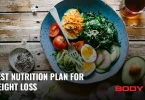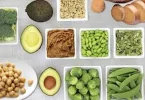Do you often feel drained, sluggish, or low on energy during the day? Many of us rely on coffee, energy drinks, or sugary snacks for a quick lift—but these solutions are temporary and can even backfire, leaving you more tired later.
The real secret to sustained energy comes from your diet. By eating the right foods, at the right time, and balancing your nutrients, you can power through your day naturally.
In this guide, we’ll share daily nutrition tips for energy boost, including what to eat, how to eat it, and practical meal strategies to maintain consistent energy levels.
Why Nutrition Plays a Key Role in Energy

Your body converts food into fuel, and the type of fuel you give it directly impacts your energy levels. Nutrient-rich foods provide:
- Vitamins and minerals for metabolism and brain function
- Protein for sustained energy and muscle repair
- Healthy fats to prevent crashes and keep you full
- Complex carbohydrates for slow-release energy
On the other hand, processed foods, refined sugars, and skipped meals lead to fatigue, poor concentration, and mid-day slumps. By choosing the right foods consistently, you can naturally stabilize your energy levels.
10 Daily Nutrition Tips for Energy Boost

1. Start with a Balanced Breakfast
Breakfast is your body’s fuel after hours of fasting. Eating a nutritious breakfast jumpstarts your metabolism and prevents energy dips later.
Include:
- Whole grains (oats, whole-wheat toast, quinoa)
- Protein (eggs, Greek yogurt, cottage cheese, or nut butter)
- Healthy fats (avocado, chia seeds, nuts)
Tip: Skip sugary cereals or pastries, which can spike blood sugar and result in an energy crash within a few hours.
2. Prioritize Complex Carbohydrates
Complex carbs are a slow-burning energy source. Unlike simple carbs (like candy or white bread), they release glucose steadily, keeping you fueled longer.
Best options:
- Brown rice and whole-grain pasta
- Quinoa, bulgur, or barley
- Sweet potatoes, yams, or butternut squash
Tip: Pair complex carbs with protein or healthy fats to prolong energy release.
3. Include Lean Protein at Every Meal
Protein helps stabilize blood sugar, prevents energy dips, and supports muscle repair.
Protein sources:
- Eggs, Greek yogurt, and cottage cheese
- Chicken, turkey, or fish
- Lentils, beans, chickpeas, tofu, or tempeh
Tip: Aim for at least 15–25g of protein per meal to maintain consistent energy.
4. Snack Smart Between Meals
Healthy snacks prevent mid-day energy slumps. Avoid processed, sugary options and focus on nutrient-dense choices:
Best snacks:
- Handful of nuts or seeds
- Fresh fruit with nut butter
- Raw vegetables with hummus
- Whole-grain crackers or rice cakes
Tip: Eating every 3–4 hours helps sustain energy and keeps blood sugar stable.
5. Stay Hydrated
Even mild dehydration can cause fatigue, headaches, and difficulty focusing.
Tips for hydration:
- Drink at least 8 glasses of water daily
- Include hydrating foods like cucumbers, oranges, watermelon, and leafy greens
- Herbal teas (like green tea) can provide mild energy boosts without caffeine overload
6. Include Iron-Rich Foods
Iron is vital for transporting oxygen in your blood. Low iron can lead to fatigue and reduced stamina.
Iron-rich foods:
- Leafy greens (spinach, kale, Swiss chard)
- Lentils, chickpeas, beans, and fortified cereals
- Red meat or poultry (if consumed)
Tip: Pair plant-based iron sources with vitamin C-rich foods (like bell peppers or citrus) to improve absorption.
7. Add Foods Rich in B Vitamins
B vitamins (B1, B2, B3, B6, B12) are essential for converting food into energy.
Sources:
- Whole grains (brown rice, oats, quinoa)
- Eggs, milk, and yogurt
- Leafy greens
- Nuts and seeds
Tip: Vegans may need B12 supplements, as it is primarily found in animal products.
8. Limit Sugar and Processed Foods
While sugar can provide a quick spike in energy, it’s followed by a crash. Processed foods like chips, candy, and sodas lead to fluctuating blood sugar, leaving you more tired.
Tip: Focus on whole, minimally processed foods for steady energy.
9. Include Healthy Fats
Healthy fats provide long-lasting energy, improve brain function, and keep you feeling full.
Best options:
- Avocado and olives
- Nuts and seeds (almonds, walnuts, chia, flax)
- Olive oil or coconut oil
- Fatty fish like salmon or mackerel
Tip: Combine fats with protein and carbs for balanced meals.
10. Time Your Meals Strategically
When you eat can be just as important as what you eat:
- Eat smaller, frequent meals instead of large, heavy ones to maintain consistent energy.
- Include protein, carbs, and healthy fats at each meal.
- Avoid skipping meals, especially breakfast, to prevent energy dips.
You may also like to read these posts:
Easy No-Cook Healthy Lunch Ideas | Quick & Nutritious
Why Homemade Recipes Are Healthier | Cook Smart & Eat Well
Best One-Pot Healthy Dinner Meals | Quick & Nutritious
Why Fiber Is Important in Diet | Health Benefits & Foods
Sample Energy-Boosting Day
Here’s a practical example of how to structure meals for sustained energy:
- Breakfast: Oatmeal with almond butter, chia seeds, and banana
- Snack: Greek yogurt with blueberries and walnuts
- Lunch: Quinoa salad with chickpeas, spinach, cherry tomatoes, and avocado
- Snack: Handful of mixed nuts and an apple
- Dinner: Grilled salmon with roasted sweet potatoes and steamed broccoli
This meal plan combines complex carbs, protein, and healthy fats to maintain energy from morning to night.
Final Thoughts
Boosting your energy doesn’t have to mean relying on caffeine, sugary drinks, or quick fixes. By following these daily nutrition tips for energy boost, you can fuel your body with nutrient-rich foods, stabilize blood sugar, and stay alert and focused throughout the day.
Focus on balance: include complex carbs, lean proteins, healthy fats, and hydrating foods. Limit processed foods and sugar. With consistent habits, you’ll notice more energy, improved mood, and better overall health.
FAQs
Q1: What are the best daily nutrition tips for energy boost?
Eat a balanced diet with complex carbs, lean proteins, healthy fats, and iron- and B vitamin-rich foods. Hydration and smart snacks also help maintain energy.
Q2: Can what I eat really affect my energy levels?
Yes. Nutrient-rich foods provide fuel for your body, stabilize blood sugar, and prevent mid-day energy crashes.
Q3: Which foods help boost energy naturally?
Best energy-boosting foods include oatmeal, eggs, nuts, seeds, lean proteins, leafy greens, fruits, and fatty fish like salmon.
Q4: How often should I eat to maintain energy throughout the day?
It’s best to eat smaller, frequent meals every 3–4 hours, including snacks if needed, to maintain consistent energy levels.
Q5: Should I avoid sugar and processed foods for better energy?
Yes. Sugary and processed foods cause temporary energy spikes followed by crashes. Whole, nutrient-rich foods are better for sustained energy.




